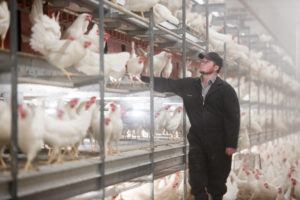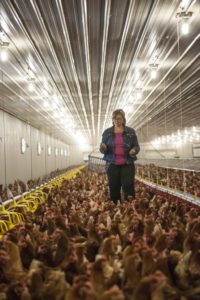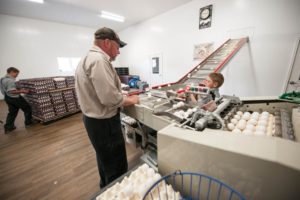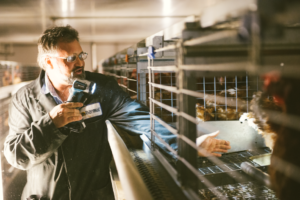EFA and Agriculture Education
Egg Farmers of Alberta (EFA) was founded in 1968, for the dual purpose of administering the provincial supply management system for the egg industry and acting as the collective, public voice of Alberta’s egg farming families. The goal was simple: promote and sell more eggs. Over the past five decades, EFA’s mandate has expanded to include managing the egg industry’s on-farm food safety, animal care, and environmental programs. EFA has also become much more active in the community, engaging with consumers and industry stakeholders, to cultivate a sustainable provincial egg industry, and build public trust in local eggs and egg farmers.
EFA and the egg farmers we represent are eager to share their story, opening their barn doors to talk about everything they do to provide their fellow Albertans with fresh, locally produced eggs. Agricultural education is vitally important to building public trust in modern egg farming. EFA is thankful to have many wonderful partners we can collaborate with to shine a spotlight on agriculture, which is the 2nd largest sector in the province. Alberta Agriculture and Forestry continues to be a champion for our industry, supporting the building of public trust through assurance initiatives, literacy, and youth education.

One such partner is the University of Alberta and, more specifically, their AN SC 101 class. Principles of Animal Agriculture is a course in the Faculty of Agricultural, Life and Environmental Sciences, which is delivered by Dr. Frank Robinson, Dr. Martin Zuidhof, and Dr. Leanna Grenwich. As with most things, the global pandemic has impacted education, but these world class educators would not be deterred from providing high-quality learning opportunities for their students. Their solution for enhancing the online learning was to invite 48 farmers from across Alberta to engage the students virtually, talking about their farming operation and experience, and answering any questions the students had about farming practices. EFA is proud that 6 egg farmers participated in this unique ag-education opportunity: Elie Hofer, Bernadette Vandenborn, Susan Schafers, Levi Hofer, Michael Hofer, and Dan Kleinsasser.
“Frank always does an exceptional job organizing the class, with an excellent cross-section of agriculture representation,” says Susan Schafers, who has participated in previous years and helped recruit some of her fellow egg farmers this year. “The Q&A is always the most enjoyable part, to interact with and learn more about the students, from the types of questions they are asking.”

Farmers joined smaller groups of students virtually, to share videos or presentations about their farms and industries.
“I shared pictures from all over my barn, including egg collection and in with the hens, and was able to talk about each picture just as I would when giving an actual tour of my barn,” says Dan Kleinsasser. “I had fun talking to the students. It was good for the industry and to help people understand what goes on in an egg barn.”

Even virtually, egg farmers are able to share what it takes to care for their hens and provide a stable supply of fresh, local eggs.
“I took the students on a journey with the birds from 1-day old chicks to pullets to layers, and on a journey with the egg from the farm to the grading station to their table at home,” says Levi Hofer. “I’m amazed that I have the opportunity to share what we do to produce eggs!”

EFA is thrilled that more and more Alberta egg farmers are getting involved and engaged with the public, whether they are caring for laying hens at major agricultural events, answering consumer questions while doing appearances in local grocery stores, or talking about their farm to help educate the next generation of agriculturalists. Egg farmers like these 6 Egg Ambassadors are able to successfully contribute to fulfilling EFA’s mission, provide value for our industry partners, and help the provincial government achieve its objective around building public trust in Alberta agriculture.
“What every one of these producers has put into this project is simply amazing,” said Dr. Frank Robinson. “Without exception, the interaction between a producer and 25 students is probably the most positive thing I have encountered in these Covid times, and likely in my career as an ag educator.”